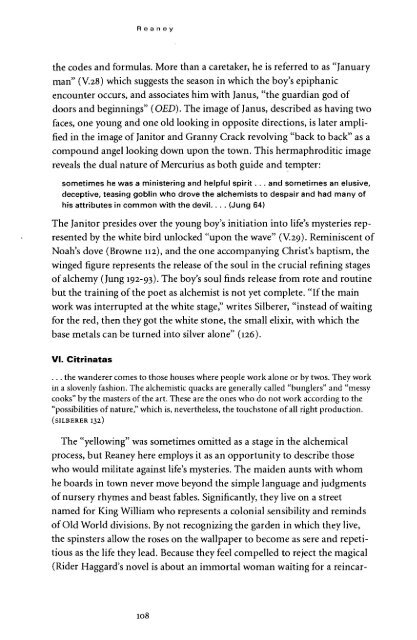Jean Rivard - University of British Columbia
Jean Rivard - University of British Columbia
Jean Rivard - University of British Columbia
Create successful ePaper yourself
Turn your PDF publications into a flip-book with our unique Google optimized e-Paper software.
Reaney<br />
the codes and formulas. More than a caretaker, he is referred to as "January<br />
man" (V.28) which suggests the season in which the boy's epiphanic<br />
encounter occurs, and associates him with Janus, "the guardian god <strong>of</strong><br />
doors and beginnings" (OED). The image <strong>of</strong> Janus, described as having two<br />
faces, one young and one old looking in opposite directions, is later amplified<br />
in the image <strong>of</strong> Janitor and Granny Crack revolving "back to back" as a<br />
compound angel looking down upon the town. This hermaphroditic image<br />
reveals the dual nature <strong>of</strong> Mercurius as both guide and tempter:<br />
sometimes he was a ministering and helpful spirit. . . and sometimes an elusive,<br />
deceptive, teasing goblin who drove the alchemists to despair and had many <strong>of</strong><br />
his attributes in common with the devil. . . . (Jung 64)<br />
The Janitor presides over the young boy's initiation into life's mysteries represented<br />
by the white bird unlocked "upon the wave" (V.29). Reminiscent <strong>of</strong><br />
Noah's dove (Browne 112), and the one accompanying Christ's baptism, the<br />
winged figure represents the release <strong>of</strong> the soul in the crucial refining stages<br />
<strong>of</strong> alchemy (Jung 192-93). The boy's soul finds release from rote and routine<br />
but the training <strong>of</strong> the poet as alchemist is not yet complete. "If the main<br />
work was interrupted at the white stage," writes Silberer, "instead <strong>of</strong> waiting<br />
for the red, then they got the white stone, the small elixir, with which the<br />
base metals can be turned into silver alone" (126).<br />
VI. Citrinatas<br />
. . . the wanderer comes to those houses where people work alone or by twos. They work<br />
in a slovenly fashion. The alchemistic quacks are generally called "bunglers" and "messy<br />
cooks" by the masters <strong>of</strong> the art. These are the ones who do not work according to the<br />
"possibilities <strong>of</strong> nature," which is, nevertheless, the touchstone <strong>of</strong> all right production.<br />
(SILBERER I32)<br />
The "yellowing" was sometimes omitted as a stage in the alchemical<br />
process, but Reaney here employs it as an opportunity to describe those<br />
who would militate against life's mysteries. The maiden aunts with whom<br />
he boards in town never move beyond the simple language and judgments<br />
<strong>of</strong> nursery rhymes and beast fables. Significantly, they live on a street<br />
named for King William who represents a colonial sensibility and reminds<br />
<strong>of</strong> Old World divisions. By not recognizing the garden in which they live,<br />
the spinsters allow the roses on the wallpaper to become as sere and repetitious<br />
as the life they lead. Because they feel compelled to reject the magical<br />
(Rider Haggard's novel is about an immortal woman waiting for a reincar-<br />
108

















